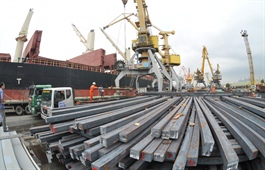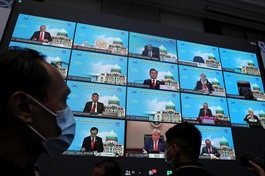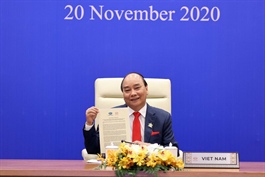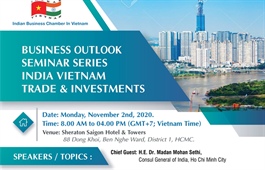FDI possible in digital cross-border services
FDI possible in digital cross-border services
With regional nations racing to lower their taxes in order to woo more investment, which may dent their coffers, creating feasible policies for collecting taxes is expected to help reach their goals of attracting more high-quality funding.

FDI possible in digital cross-border services, illustration photo
|
According to investment experts like Vu Tu Thanh, deputy regional managing director and senior country representative of the US-ASEAN Business Council in Vietnam, instead of reducing taxes like corporate income tax (CIT), countries like Vietnam should pay attention to high-tech giants in combination with building suitable policies.
“In order to build a new and innovative strategy, we should understand how the economies over the world are developing, and how business models are changing to catch up with new technology trends,” said Thanh.
Besides manufacturing, which has been one of Vietnam’s key foreign direct investment (FDI) attraction sectors over the last three decades, more sophisticated production channels combined with complex global supply chains are on the rise, which are suitable with Resolution No.50-NQ/TW on orientations to perfect mechanisms and raise the quality and efficiency of FDI by 2030.
According to Thanh, the new subjects for FDI attraction could be cross-border digital platforms, which are much different from traditional channels. For example, although not establishing any office or representative in destination countries, tech giants like Amazon, Google, Facebook, Microsoft, Netflix, and Spotify have already poured a lot of money into developing their presence in markets like Vietnam.
“These cross-border products are generating the same profits that traditional investment channels create,” Thanh argued, adding that these digital platforms could not only offer additional income for the country but also offer jobs for locals.
“For instance, thanks to the localisation of Apple’s App Store, the Vietnamese app Flappy Bird has become popular all over the world, and a lot of small- and medium-sized enterprises can follow suit with cross-border digital and e-commerce offers, thus creating jobs for Vietnamese like foreign-invested enterprises do,” Thanh explained.
Regarding tax contributions of these companies, Thanh said that most countries are struggling to find the right policies for collecting CIT, pointing out that meanwhile, “most cross-border investors are ready to pay taxes if a proper and synchronous policy is issued.”
Currently, ASEAN countries are racing to reduce their CIT rates and offer aggressive tax incentives to foreign corporations.
Across the region, the average CIT rate has fallen over the last 10 years from 25.1 per cent in 2010 to 21.7 per cent this year, according to the Vietnam Institute for Economic and Policy Research (VEPR). But international institutions like the Organization for Economic Co-operation and Development and the UN Conference on Trade and Development have repeatedly warned ASEAN to stop offering redundant tax incentives due to their costs on budget revenue, tax base erosion, and creating room for tax avoidance and evasion, according to Babeth Ngoc Han Lefeur, country director for Oxfam Vietnam, earlier this year.
In addition to such CIT cuts, the use of other enormous profit-based incentives to attract FDI, like tax holidays, are prevalent in ASEAN countries.
“However, the costs of redundant fiscal incentives can possibly exceed the benefits of additional FDI. Offering excessive CIT cuts poses a threat to national budget revenues,” Pham Van Long, researcher at VEPR argued. Currently, lost budget revenue due to CIT incentives is estimated at 6 per cent of GDP in Cambodia, 1 per cent GDP in Vietnam, equivalent to about $2-2.5 billion.
Ah Maftuchan, public policy analyst at the Perkumpulan Prakarsa Centre for Welfare Studies in Indonesia commented, “ASEAN countries cannot afford such losses in the current economic and social crises in our region. We need to make the choice, whether building sustainable societies better prepared to face future shocks or to help some companies minimising their tax bills. Who is coming first?”



























